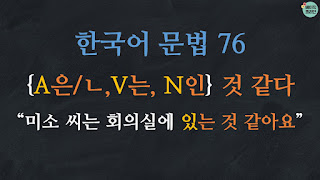Learn Korean | Korean Grammar 132: N-이었다고 하다/였다고 하다 (indirect quotation)
Welcome to Basic Korean. In this lesson, we will look at the expression 'N-이었다고 하다/였다고 하다' which is used to indirectly quote a sentence whose type of sentence is 'declarative sentence', ends with 'noun', and the point of time is 'the past tense'.
Let's study 'indirect quotation' in Korean 'N-이었다고 하다/였다고 하다.'
If you want to watch this lesson in Korean with English subtitles, please click the link below.
⭐️ Korean grammar lesson 132: https://youtu.be/Np4ieuQMQTw
⭐️ 한국어 문법 132: N-이었다고 하다/였다고 하다
‘미소 씨는 꿈이 가수였다고 했어요.’
1. Short Conversation
- 지안: 어제 미소 씨랑 노래방에 갔었는데, 미소 씨가 노래를 정말 잘 하더라고요.
- 나나: 지난번에 미소 씨가 그랬는데, 원래 꿈이 가수였다고 했어요. 그래서 노래를 잘하는 것 같아요.
→ The grammar we're going to learn today is '가수였다고 했어요.'
(in English)
- Jian: I went to a karaoke room with Miso yesterday, and Miso was really good at singing.
- Nana: Last time, Miso said that her dream was to be a singer. I think that's why she is good at singing.
2. Usage
- Indirect Quotation (간접 인용): It is used when the speaker quotes another person's words or writings (indirectly) from the speaker's point of view.
- '이었/였' is the combination of '이다' which is a particle and '었' which is an ending of a word that indicates an event or action has occurred in the past.
- '-이었/였다고 하다' is used to quote a sentence that is declarative, past tense and ending with a noun.
- And instead of the verb ‘하다’, you can also use ‘말하다, 그러다, and so on.'
3. Example Sentences
✎ Miso: “제 꿈은 가수였어요.” (→ noun, past tense, declarative sentence)
(“My dream was to be a singer.”)
→ Indirect quotation: 미소 씨 꿈은 가수였다고 했어요. (가수 + 였다고 하다)
- When you look at this sentence, it ends with the noun. It is the past tense and a declarative sentence.
- If you want to quote indirectly, you can add '였다고 하다' after the noun '가수.'
- And when writing, delete the double quotation marks.
- Then you can say ‘미소 씨 꿈은 가수였다고 했어요.’
- Here '가수였다고 했어요' is a combination of the noun '가수' and '-였다고 하다'.
- And if you look at the tense, the tense of Miso's speech is the past tense, and the tense of the indirect quotation is also the past tense.
✎ 미소: “저는 회사원이었어요.” (→ noun, past tense, declarative sentence)
(“I was an office worker.”)
→ Indirect quotation: 미소 씨는 회사원이었다고 했어요. (회사원 + 이었다고 하다)
- When you look at this sentence, it ends with the noun. It is the past tense and a declarative sentence.
- If you want to quote indirectly, you can add '이었다고 하다' after the noun '회사원.'
- And when writing, delete the double quotation marks.
- Then, you can say ‘미소 씨는 회사원이었다고 했어요.’
- Here '회사원이었다고 했어요' is a combination of the noun '회사원' and '-이었다고 하다'.
- And if you look at the tense, the tense of Miso's speech is the past tense, and the tense of the indirect quotation is also the past tense.
4. Combination Information
- ‘이었다고 하다/였다고 하다’ attaches a noun
(1) Final Consonant O: -이었다고 하다
- When the preceding noun has the final consonant, '-이었다고 하다' is used.
- 학생 + 이었다고 하다 → 학생이었다고 하다
- When you look at '학생', there is the final consonant.
- Then '-이었다고 하다' is used after that.
- So you can say '학생이었다고 하다’.
- 도서관 + 이었다고 하다 → 도서관이었다고 하다
- When you look at the noun '도서관', there is the final consonant.
- Then '-이었다고 하다' is used after that.
- So you can say '도서관이었다고 하다.’
(2) Final Consonant X: -였다고 하다
- On the other hand, when the preceding noun does not have the final consonant, '-였다고 하다' is used.
- 가수 + 였다고 하다 → 가수였다고 하다
- When you look at '가수', there is no final consonant.
- Then '였다고 하다' is used.
- So you can say '가수였다고 하다.’
- 기숙사 + 였다고 하다 → 기숙사였다고 하다
- When you look at '기숙사', there is no final consonant.
- Then '-였다고 하다' is used after that.
- So you can say '기숙사였다고 하다’.
5. Practice
✎ 지안 씨가 “지난 번에 한 말은 농담이었어요.” 했어요.
(Jian said "What I said last time was a joke.")
→ 지안 씨가 지난 번에 한 말은 농담이었다고 했어요. (농담 + 이었다고 하다)
✎ 나나 씨가 “그 결정은 미소 씨를 위한 일이었어요.” 했어요.
(Nana said, "The decision was for Miso.")
→ 나나 씨가 그 결정은 미소 씨를 위한 일이었다고 했어요. (일 + 이었다고 하다)
✎ “미소 씨와 나나 씨는 친한 사이였어요.” 그랬어요.
(“Miso and Nana were close friends.” I heard.)
→ 미소 씨와 나나 씨는 친한 사이였다고 그랬어요. (사이 + 였다고 그러다)
#베이직코리안 #한국어문법 #Basickorean #Koreangrammar #이었다고하다 #였다고하다 #이었다고 #였다고 #간접인용 #간접화법 #indirectquotation
_basickorean.jpg)

